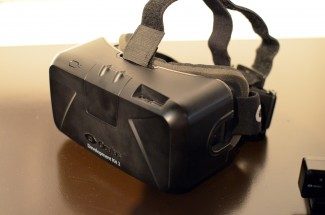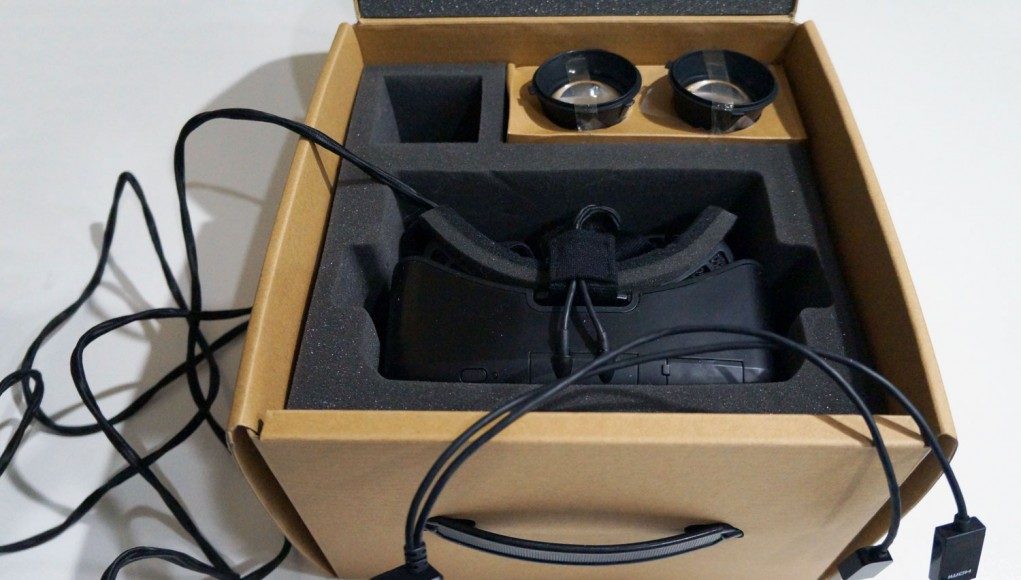It’s DK2 month, with swaths of developers and enthusiasts eagerly awaiting a knock on the door from their local delivery man. An anonymous source has revealed an unboxing of the highly anticipated Oculus Rift DK2.
In a recent update from Oculus VR, the company says that the first Oculus Rift DK2 batch has left the manufacturing site and is on the way to distribution centers. Developers and enthusiasts around the world are hoping to be included in that first shipment which is expected to start reaching doorsteps by the end of the month.
For a select few, Christmas in July has come early. An anonymous tipster has passed along some Oculus Rift DK2 unboxing photos along with thoughts on the unit so far.
“The unit feels solid and not heavy. There are A and B lenses (no C) but switching out the lenses is much easier than with the DK1. I also love the expansion port on the top; having a USB port on the HMD opens up many possibilities for expanding the VR experience. I’m still getting used to developing with it. There are a few things that seem different after using the DK1; the screen is rotated 90-degrees counter-clockwise by default when you plug it into a Windows machine.
The low res screen door effect is much improved over the DK1 with only minor hints of it remaining. That said, I don’t think the world is ready for UHD VR (at least not on the computing power side of things).
The screen is crazy smooth in motion. The color, contrast, and motion is leaps and bounds over the DK1,” says the anonymous source.
The A and B lenses from the DK2 are apparently not the same height as their counterparts from the DK1; the lenses are also not interchangeable.
The 90 degree rotation is likely due to the DK2’s screen having been originally designed for a phone’s native portrait orientation; at this point, all hints point to Samsung as being the provider of the display. In smartphones, screen rotation is generally handled in software—it’s likely that the Oculus SDK will be take care of that task.
 In addition to the ports needed for the DK2 to connect and operate with the computer, the headset also features an extra on-board USB port. Oculus hopes it will make a convenient attachment point for tinkerers to experiment with peripherals like the Leap Motion depth camera. The headset also includes an extra Sync port, same as the one found on the IR camera. So far it is unused, but could be utilized to gather the same data provided to the IR camera—presumably including syncing a second IR camera mounted on the DK2.
In addition to the ports needed for the DK2 to connect and operate with the computer, the headset also features an extra on-board USB port. Oculus hopes it will make a convenient attachment point for tinkerers to experiment with peripherals like the Leap Motion depth camera. The headset also includes an extra Sync port, same as the one found on the IR camera. So far it is unused, but could be utilized to gather the same data provided to the IR camera—presumably including syncing a second IR camera mounted on the DK2.
The Oculus Rift DK2 comes with the following:
- Headset
- IR camera
- Detachable 10 ft cable (splits on the ends to HDMI 1.4b and male USB)
- Two sets of lenses (normal and nearsighted)
- HDMI to DVI adapter
- DC power adapter (only needed when using the DK2’s extra on-board USB port)
- Three international power adapters (UK, AU, and EU),
- Sync cable (which connects to the IR camera)
- Lens cleaning cloth
Oculus says that 45,000 Rift DK2s have been ordered since the VR headset’s announcement back at GDC 2014 in March. The DK2 is available for purchase for $350, but the company stresses that it is only intended for developers.
















